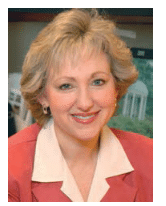
The Sky’s the Limit
Dental hygiene icon foresees a continuing upward trajectory for the profession.

When North Carolina high school student Rebecca Wilder’s best friend got a part-time job in a dental office, Wilder followed suit. But what started off as a part-time high school gig developed into a lifelong career.
Professor and Assistant Dean for Professional Development and Faculty Affairs at the University of North Carolina (UNC)-Chapel Hill Adams School of Dentistry (ASoD), Rebecca Wilder, BSDH, MS, kindly took time out of her busy schedule to share her perspective from the world of academics on the dynamic field of dental hygiene.
Q: What drew you to the academic side of dental hygiene?
A: Once I got into the field, I absolutely loved it. After working as a dental assistant, I obtained a dental hygiene degree at Guilford Technical Community College in Jamestown, NC, and then completed my bachelor’s and master’s degrees in dental hygiene at the University of Missouri-Kansas City.
I love variety and the opportunity to learn. And the opportunities for someone in academics are incredible. I’ve been a teacher, administrator, researcher, consultant, speaker, writer, and now a professional coach.
Q: In which of these capacities do you currently enjoy working the most?
A: I really love working with the dental and dental hygiene faculty and seeing them grow in their careers. Mentoring and helping faculty develop have been the most rewarding parts of my professional life. After many years of teaching and directing a graduate program for dental hygienists, I am now leading a new Office of Professional Development at the ASoD. It’s a very exciting time!
Q: What are the greatest challenges you see for graduating dental hygienists entering the workforce today?
A: I think that finding employment where they can be utilized to the greatest extent is a challenge. For instance, some states have more restrictive practice acts. We are seeing changes throughout the country, but we still have a lot of work to do.
Also, changing work patterns are presenting challenges for the entire dental profession. We’re seeing much more corporate dentistry proliferating throughout the country, and I think, in many cases, we’re not prepared for it.
Q: What insights did you gain from the leadership course you completed at Georgetown University?
A: It was a certificate program in executive leadership coaching, which is something that’s really new in dentistry. The philosophy of coaching is that clients are fully capable of making their own decisions about their careers, career path, or whatever issues they are struggling with. My role as a coach is really just to facilitate growth and decision making with the client.
Q: What advice would you give to dental hygienists wanting to expand their career options?
I would take them through some coaching sessions and ask them pertinent questions that would identify their aspirations, what’s holding them back, etc.
Career options for dental hygienists are endless, ranging from private practice, research positions, and association work to public health, speaking, consulting, and higher administration.
Many dental hygienists are now pursuing advanced degrees. The higher the degree, the more career options become available.
Q: What do you foresee as far as expanded scope of practice for the dental hygiene profession going forward?
A: We’ve made much progress over the past 10 or 15 years despite hurdles such as opposition by organized dentistry, issues surrounding general health care, and access to care. I’m optimistic about the future and the expanded scope of practice for dental hygienists.
Q: In your view, what will be the hot topics for this decade?
A: There are several, including expanded practice models and how to educate dental hygienists to work in such settings; technology; access to care; the integration of oral health into general health care; and an updating of accreditation standards that will best prepare our graduates for the future.

